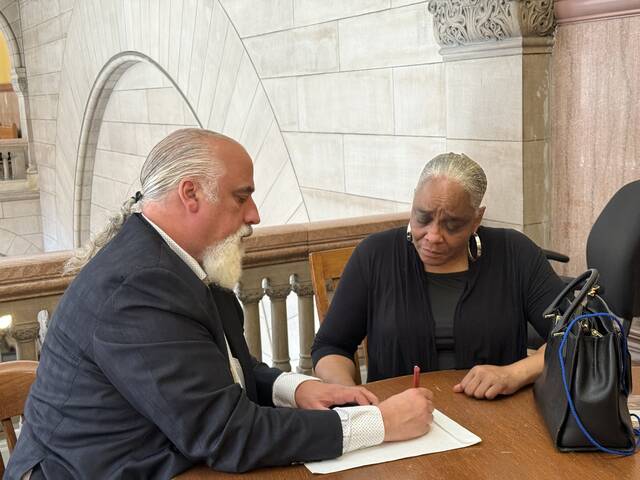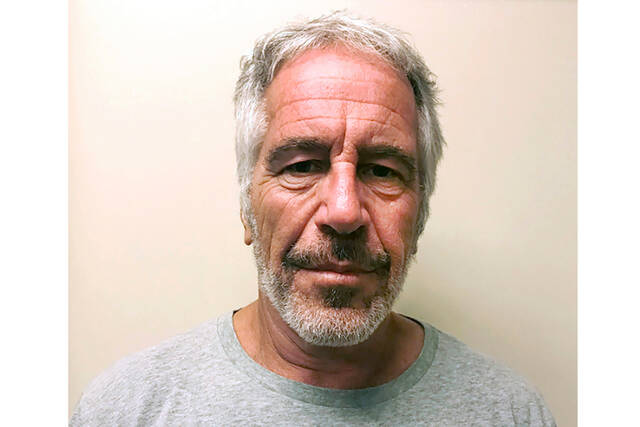The two women pleaded with the judge not to accept the deal.
They had just listened to the prosecutor describe the injuries the killer inflicted on their loved ones.
Valorie Crumpton, who was 72, sustained nine fractures to her skull, multiple broken ribs, a laceration to her abdomen and a broken leg.
Tionna Banks, 19, had a stab wound through her left temple, another in her neck; five skull fractures and stab wounds to her chest, back, arm and thigh.
They were brutally, deliberately killed by a man against whom Banks had a restraining order.
Cesar Mazza, the women told the court on Wednesday, deserves to be in prison for the rest of his life — not for 30 to 60 years, as offered by the Allegheny County District Attorney’s office.
“We didn’t get to share our wishes for what we feel should happen to the man that killed our loved ones,” Robin Crumpton told the judge. “We’re the victims. We were robbed of our chance to go to trial, to fight for our niece and mother.”
“It would crush our family if he only got 15 years per body.”
Despite their urging, Allegheny County Common Pleas Judge Edward J. Borkowski accepted Mazza’s plea to two counts of third-degree murder and sentenced him to serve 30 to 60 years in state prison.
“At his age, this could, in effect, be a life sentence,” the judge told the family. “I extend my sympathy to you. I thoroughly understand your disappointment and your criticism.
“It should, ultimately, be visited on the entire system and not just one entity.”
Family lashes out at DA
Mazza, 35, was charged in August 2015 with killing Crumpton and Banks at Crumpton’s East Hills home on May 4, 2015.
He and Banks had a child together, and family members said he was angry at her for not naming the baby after him.
He had previously assaulted her, police said, including stomping on her pregnant stomach and throwing her down a set of stairs.
After Mazza was arrested, District Attorney Stephen A. Zappala Jr. filed notice that he would seek the death penalty.
Although capital cases often take a few years to wind through the criminal justice system, Mazza’s languished even longer than usual.
He fired at least a half-dozen defense attorneys, and the case bounced among five other judges before being assigned to Borkowski in January.
He scheduled it for trial next week.
But in August, the victims’ family asked that the death penalty be taken off the table because they believed it would never be imposed and wanted to move the case along. The prosecution agreed.
After that, according to a statement released by the DA’s office Wednesday, Mazza’s defense attorneys asked for a plea to third-degree murder for 25-50 years.
The deal was presented to the victims’ family members, who objected.
The DA’s office then presented a counteroffer to Mazza for 30 to 60 years “considering all the surrounding factual and evidentiary circumstances,” the DA’s office said in a statement issued Wednesday after the hearing.
“While we are aware of the family members’ objection to the plea agreement, we have a responsibility to consider the evidence and procedural posture of a case and must make the difficult final decision on how to proceed.
“District Attorney Zappala respects the family’s position and is aware that no resolution today could ever make them whole.”
“The system completely failed us,” she said after the hearing. “I’m so hurt. I’m so devastated. Stephen Zappala wanted this off his books and didn’t want to deal with us.
“It was swept under the rug.”
DNA evidence
During Wednesday’s hearing, the judge asked Deputy District Attorney Ryan Kiray if he would like to place on the record why the case went from being a first-degree murder case with a potential death penalty to third-degree murder.
“Not at this time, your honor,” Kiray responded.
Borkowski then listened as the prosecution outlined the details of the crime.
Kiray told the court that Mazza’s ex-girlfriend would have testified she drove him to Valorie Crumpton’s house on the day of the murders. His sister would have testified that when Mazza arrived at their mother’s house later that day, both he and his infant child were covered in blood.
In addition, Kiray said, Mazza’s DNA was recovered from the handles of the weapons that were used — a knife and a fireplace shovel. Investigators said Mazza also used a fireplace poker in the attack.
Haunting absence
Following the summary, the prosecution presented victim impact testimony.
Rose Price, who was Crumpton’s niece and Banks’ aunt, told the judge that Crumpton loved to sing.
“Valorie was the light of our family,” she said. “Her voice was the soundtrack to our happiest moments.
“Their absence haunts every single family gathering. What once was joy is now grief.”
Robin Crumpton told the court that the death of her mother and niece devastated their family.
“The whole dynamic of my family has completely changed,” she said.
She said she also feels a horrible sense of guilt because she was her mother’s protector.
“We waited 11 years to have a case and hear our voice,” Crumpton said. “I’m pleading with the court to have mercy on our family.”
Borkowski was sympathetic.
“This circumstance should never have occurred,” Borkowski said of letting the case go on for a decade. “Someone should have put their procedural foot down, but they didn’t.”
Mazza speaks
While no witnesses were called on Mazza’s behalf, he did address the court.
“I know what I say today can’t make the family of Tionna and Valorie feel any better, but I regret going to the house that day. I am so remorseful,” he said. “This was never supposed to happen.”
Mazza told the court he has nightmares and is now on medication and in therapy.
“I wish I could give my life up and die right now so they could come back. I did not intend for any of this to happen,” he said. “I’m so traumatized by this.”
Borkowski then imposed sentence.
After the hearing, the judge asked Crumpton and Price to speak to him in his chambers.
“You could tell how upset he was, how sympathetic he was,” Crumpton said.
Neither Kiray nor Deputy District Attorney Jennifer Berosh spoke with the victims’ family afterward.
Bobby Shaw, a former Pittsburgh homicide detective who was the lead investigator on the case, however, comforted them as they walked down the hallway and talked to them for several minutes.
“The plea is disappointing, and I can sympathize with the family’s anger and frustration,” Shaw said. “But at the same time, I understand, to a degree, why the decision was made. I think the bigger issue is it lingered for such a long time when it shouldn’t have.”
Crumpton said the family will work to ensure Mazza doesn’t get parole.
“We’re going to fight to keep him in jail,” Crumpton said.
Still, it doesn’t change her feelings about how the family was treated by the prosecution.
“That’s the travesty of this case,” said Geraldine Massey of the Center for Victims. “All systems have failed them. You can’t say one person did this. This is the system’s failure.”

















